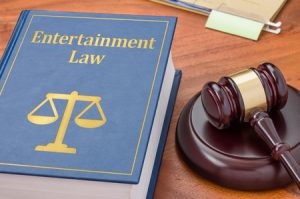A lot of law students and young attorneys aim to get into the field of entertainment law. What does it mean to practice entertainment law?
 Today, entertainment law is more of a combination of contract law, intellectual property law, accounting and just about every other area of law for which an individual or company requires legal services. So, if someone wants to work specifically in entertainment law, there are a few things he or she needs to do.
Today, entertainment law is more of a combination of contract law, intellectual property law, accounting and just about every other area of law for which an individual or company requires legal services. So, if someone wants to work specifically in entertainment law, there are a few things he or she needs to do.
Stanton (“Larry”) Stein, partner in Liner’s Entertainment & Media Litigation Group and Ashley Yeargan, partner at Liner LLP, recently sat down with IPWatchdog to discuss if there is such a thing as “entertainment law” and what it takes for young attorneys to break into this competitive business.
First of all, one must become a quality lawyer, according to Stein. Perfect your profession to create the building blocks and become involved in bar associations and other trades organizations that have entertainment sections, he advises. In addition, read the trades and understand the industry – try to make contact with transactional entertainment lawyers, managers and agencies, and agree to provide your services in whatever capacity they might need.
“Developing an entertainment clientele is like developing a clientele in any other area of the law,” he explained. “Learn the law relevant to entertainment matters and then write articles, lecture, and attend entertainment related events at every opportunity. Most importantly, do good legal work and clients will come.”
Yeargan calls herself an entertainment lawyer, but as a litigator, all that means is that her practice is focused on clients who have business that is somehow connected to the entertainment industry.
“At the end of the day, our matters are IP disputes, breach of contract actions, and tort cases,” she said. “The only difference from general commercial litigation is that the product at issue in any dispute is a film, television series, or song or issues related to the production, ownership or exploitation of such works.”
What an entertainment practice today would look like depends upon whether it related to transactional entertainment or entertainment litigation. It also depends on what you want to specialize in, film, television, music, internet, publications, therefore, most practices are called media and entertainment rather than just entertainment, per Stein.
Within each of those practice areas, there are specialties depending on whether you are representing networks, record labels, studios, guilds, agencies, managers or talent. Also, there several different areas of law that a lot of famous people need help with including contractual disputes involving their services and profit participations.
Right now, a growing area of need for famous people is dealing with written publications and the Internet, generally defamation, rights of privacy and rights of publicity. “Sometimes unfortunately and increasingly, famous people need assistance with criminal matters, security matters and employee matters regarding their various employees,” explained Stein.
In order for someone to acquire entertainment clients, Yeargan thinks it is important to have a mentor who is well-respected and connected in the entertainment industry and to make sure that he or she introduces you to his or her contacts in the industry. Additionally, it is helpful to join as many groups or associations as possible that have studio executives, agents, managers, producers, directors, and writers among their members. Networking with transactional entertainment lawyers is also extremely vital to developing a litigation practice focused on entertainment industry disputes.
“I worked in a non-legal capacity in the industry for two summers while in college and I found that was helpful in terms of learning how production works and making contacts within the industry,” she said.
Today, entertainment litigators primarily handle or coordinate matters for famous people that concern their professional businesses and protection of their brand, according to Yeargan. This work ranges from disputes about performance agreements, to disputes with former representatives relating to commissions, to profit participation cases against studios or record labels, to defamation actions against a range of individuals and media outlets that might publish something false and salacious that can destroy a client’s reputation and endanger all of his or her projects.
“In a lot of ways, celebrities are no different than any other high net worth individuals who have many assets to manage and people they employ and/or support,” she explained. “In that regard, entertainment lawyers, and particularly transactional entertainment lawyers, also handle or oversee celebrity real estate transactions, advice regarding professional and household employees, tax matters, and domestic relations issues (including pre-nuptial agreements, divorces, and even restraining order proceedings).”
However, a key difference with a celebrity is that people all over the world are interested in both their public projects and private matters and, often, will pay to get such information. Because of that, confidentiality agreements are extremely important in all matters and protective orders are key in litigation matters.

![[IPWatchdog Logo]](https://ipwatchdog.com/wp-content/themes/IPWatchdog%20-%202023/assets/images/temp/logo-small@2x.png)

![[Advertisement]](https://ipwatchdog.com/wp-content/uploads/2024/04/Patent-Litigation-Masters-2024-sidebar-early-bird-ends-Apr-21-last-chance-700x500-1.jpg)

![[Advertisement]](https://ipwatchdog.com/wp-content/uploads/2021/12/WEBINAR-336-x-280-px.png)
![[Advertisement]](https://ipwatchdog.com/wp-content/uploads/2021/12/2021-Patent-Practice-on-Demand-recorded-Feb-2021-336-x-280.jpg)
![[Advertisement]](https://ipwatchdog.com/wp-content/uploads/2021/12/Ad-4-The-Invent-Patent-System™.png)







Join the Discussion
One comment so far.
Mike Oliver
June 21, 2017 11:04 amAbout 20 years ago a similar question was debated by two leading jurists, which was a great discussion on how law is taught – it started with Judge Easterbrook’s law review article “Cyberspace and the Law of the Horse” to which Lawrence Lessig retorted in “The Law of the Horse: What Cyberlaw Might Teach” – see https://en.wikipedia.org/wiki/Law_of_the_Horse (links there). So, the issue you raise is often known as the “Law of the Horse” issue.
At least in my practice, we are clear about what we are and are not – we are not agents and do not accept payment as part of the artist’s compensation. Indeed, we have negotiated engagements for our clients with such lawyers. So my own demarcation, from a practical perspective, is whether the lawyer provides solely legal advice, or whether the lawyer provides business advice (as in, negotiating the key business terms) or takes the fee from compensation payments.